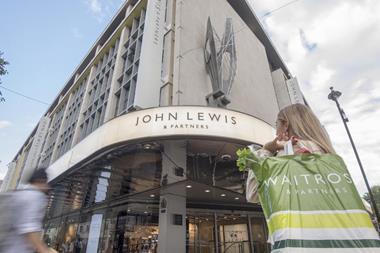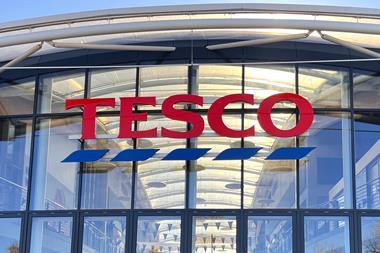A reshaped financial services market is allowing the supermarkets to widen the number of products on offer. John Hancock reports
The supermarkets, with their keen prices and convenient opening times, clearly envisage financial services as an ideal way to leverage their client relationships and convenient, lifestyle-friendly opening times to create more occasions when customers will visit their stores.
However, there are notes of caution to be sounded. In particular, the Financial Services Authority emphasises that giving advice about any financial service is a regulated activity and so, while the authority has no problem with straightforward products being sold off the shelf, it would hold the product provider responsible for compliance with regulations.
In turn, the providers would need to ensure neither the retailer nor their staff offered advice with the product.
When the Chancellor, Gordon Brown, launched stakeholder pensions, he foresaw people picking up pension schemes and savings accounts along with their weekly shop. Initially, the plan was received with some scepticism in the financial services community.
But the mood changed when the decision was made to depolarise the dual system of independent financial advisers and tied agents - the latter restricted to selling products from one company - and establish new multi-tied agents that would be able to supply products from several providers.
It wasn’t long before the supermarkets, buoyed further by the simplification of some of the products allowing several to be sold without advice or underwriting, saw the potential to add new products to the loans and bank accounts already on offer.
And now, for the big players, it appears that the sky is the limit. Tesco has launched branded mortgages this week to accompany the range of financial and related products already available in its stores, including life and general insurance policies. However, they are not, as yet, available to simply pass through the checkout scanner.
Tesco has also launched a range of legal products available through its website in conjunction with legal publishing firm Lawpack.
They are designed to provide simple solutions for wills, tenancy agreements and similar documents at very low prices - showing that almost any service can be packaged for retail.
Meanwhile, Sainsbury has launched Saveback, which is similar to cashback, but offers shoppers paying by debit card the opportunity to transfer money to a savings account as part of their transaction in the same way that
they can draw cash. Sainsbury’s confidence in Saveback is based on research revealing that 12 million people would be interested in a savings facility that could be accessed when doing the family shop.
And the Co-operative Group with Co-operative Financial Services has just launched Co-op Money in 66 convenience and Market Town stores offering a range of financial products, from loans and credit cards to motor and home insurance.
David Newman, director of marketing management at CFS, says: “The supermarket sector is becoming an important distribution channel for consumers who are purchasing financial products.”
But the sudden flurry of activity is not restricted to the major multiples. In theory, any financial or related product that can be simplified for an advice-free sale and packaged for the retail shelf could be sold through any shop. That might include term life insurance plans, stakeholder pensions, pet insurance, funeral insurance, travel insurance, will packs and other legal services… indeed, anything where the documentation is standard.
Insurance firms such as Norwich Union already market a number of products this way, usually as own brand white label products and often with premiums that are collected at the retail outlet - examples are travel insurance bought with a holiday or motor insurance bought with a car.
Other specialist law firms such as Goldsmith Williams have a range of packaged services - conveyancing, personal injury claims and will-writing packs. Edward Goldsmith, senior partner, says: “It would certainly be practical to offer a range of white label products to retail chains or marketing groups or even to offer Goldsmith Williams-branded products to smaller stores.”
Where financial products cannot be offered in-store because they need to be varied according to the applicants’ individual circumstances, leaflets could be made available.
So, if creating a product range is feasible, what about paying for the product? Straightforward packages such as travel insurance, will-writing packs and conveyancing require only one-off payments and it would be feasible to box the associated materials in the same way as days out, such as motor racing or ballooning, are boxed, read by the barcode reader and carried away by the purchaser.
However, many financial products require a continuing payment programme. The Co-op, for instance, already makes provision for its customers to pay into their Co-op mini cash ISAs at in-store checkouts.
Jonathan Hewitt, business development director at Sainsbury’s Bank, says that the initial focus with Saveback will be on getting the new idea to work for the stores and for the customers, making savings a more accessible transaction.
And he agrees that such a system could, in the future, also be used to transfer money into other types of accounts.
While this is all well and good for customers with a bank account, 17% of the UK adult population do not have access to banking facilities and they would need an alternative. The solution could well be found in the convenience sector, which is already equipped with payment-processing terminals that might enable these people to access financial products that require regular payments.
The latest centre from PayPoint is described by spokesman Don Hunter as, “a terminal through which one can make a wide range of payments”. They include phone top-up, congestion charges, travel ticketing and even making regular payments towards a holiday. It also includes saving into the host store’s Christmas Club - a simple saving scheme.
While any scheme would need to be examined individually, PayPoint sees no reason why equipment and networks such as its own could not handle a range of financial product transactions.
The supermarkets, with their keen prices and convenient opening times, clearly envisage financial services as an ideal way to leverage their client relationships and convenient, lifestyle-friendly opening times to create more occasions when customers will visit their stores.
However, there are notes of caution to be sounded. In particular, the Financial Services Authority emphasises that giving advice about any financial service is a regulated activity and so, while the authority has no problem with straightforward products being sold off the shelf, it would hold the product provider responsible for compliance with regulations.
In turn, the providers would need to ensure neither the retailer nor their staff offered advice with the product.
When the Chancellor, Gordon Brown, launched stakeholder pensions, he foresaw people picking up pension schemes and savings accounts along with their weekly shop. Initially, the plan was received with some scepticism in the financial services community.
But the mood changed when the decision was made to depolarise the dual system of independent financial advisers and tied agents - the latter restricted to selling products from one company - and establish new multi-tied agents that would be able to supply products from several providers.
It wasn’t long before the supermarkets, buoyed further by the simplification of some of the products allowing several to be sold without advice or underwriting, saw the potential to add new products to the loans and bank accounts already on offer.
And now, for the big players, it appears that the sky is the limit. Tesco has launched branded mortgages this week to accompany the range of financial and related products already available in its stores, including life and general insurance policies. However, they are not, as yet, available to simply pass through the checkout scanner.
Tesco has also launched a range of legal products available through its website in conjunction with legal publishing firm Lawpack.
They are designed to provide simple solutions for wills, tenancy agreements and similar documents at very low prices - showing that almost any service can be packaged for retail.
Meanwhile, Sainsbury has launched Saveback, which is similar to cashback, but offers shoppers paying by debit card the opportunity to transfer money to a savings account as part of their transaction in the same way that
they can draw cash. Sainsbury’s confidence in Saveback is based on research revealing that 12 million people would be interested in a savings facility that could be accessed when doing the family shop.
And the Co-operative Group with Co-operative Financial Services has just launched Co-op Money in 66 convenience and Market Town stores offering a range of financial products, from loans and credit cards to motor and home insurance.
David Newman, director of marketing management at CFS, says: “The supermarket sector is becoming an important distribution channel for consumers who are purchasing financial products.”
But the sudden flurry of activity is not restricted to the major multiples. In theory, any financial or related product that can be simplified for an advice-free sale and packaged for the retail shelf could be sold through any shop. That might include term life insurance plans, stakeholder pensions, pet insurance, funeral insurance, travel insurance, will packs and other legal services… indeed, anything where the documentation is standard.
Insurance firms such as Norwich Union already market a number of products this way, usually as own brand white label products and often with premiums that are collected at the retail outlet - examples are travel insurance bought with a holiday or motor insurance bought with a car.
Other specialist law firms such as Goldsmith Williams have a range of packaged services - conveyancing, personal injury claims and will-writing packs. Edward Goldsmith, senior partner, says: “It would certainly be practical to offer a range of white label products to retail chains or marketing groups or even to offer Goldsmith Williams-branded products to smaller stores.”
Where financial products cannot be offered in-store because they need to be varied according to the applicants’ individual circumstances, leaflets could be made available.
So, if creating a product range is feasible, what about paying for the product? Straightforward packages such as travel insurance, will-writing packs and conveyancing require only one-off payments and it would be feasible to box the associated materials in the same way as days out, such as motor racing or ballooning, are boxed, read by the barcode reader and carried away by the purchaser.
However, many financial products require a continuing payment programme. The Co-op, for instance, already makes provision for its customers to pay into their Co-op mini cash ISAs at in-store checkouts.
Jonathan Hewitt, business development director at Sainsbury’s Bank, says that the initial focus with Saveback will be on getting the new idea to work for the stores and for the customers, making savings a more accessible transaction.
And he agrees that such a system could, in the future, also be used to transfer money into other types of accounts.
While this is all well and good for customers with a bank account, 17% of the UK adult population do not have access to banking facilities and they would need an alternative. The solution could well be found in the convenience sector, which is already equipped with payment-processing terminals that might enable these people to access financial products that require regular payments.
The latest centre from PayPoint is described by spokesman Don Hunter as, “a terminal through which one can make a wide range of payments”. They include phone top-up, congestion charges, travel ticketing and even making regular payments towards a holiday. It also includes saving into the host store’s Christmas Club - a simple saving scheme.
While any scheme would need to be examined individually, PayPoint sees no reason why equipment and networks such as its own could not handle a range of financial product transactions.















No comments yet